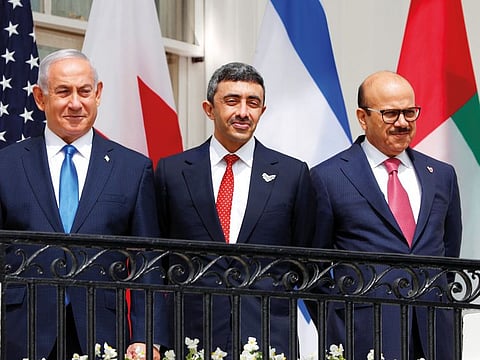UAE and Israel: A new era of economic possibilities
The historic Abraham Accord opens up immense potential for economic co-operation

The UAE signed the historic Abraham Accord with Israel at a ceremony in Washington on 15 September, in the first such agreement between an Arab country and Israel in over a quarter of a century.
The deal opens up immense potential for economic co-operation and bilateral investments in areas including logistics, aviation, agricultural technology, green energy, and food and water security.
“The historic UAE-Israel Abraham Accord peace deal is a breakthrough that will help unfold benefits for both economies across multiple sectors, and especially boost trade, investment and tourism,” says Jassim Alseddiqi, CEO of Shuaa Capital.
“With diplomatic and business ties officially normalised, we can expect to see many new business negotiations and co-operation agreements in the near future.”
Trade agreements
The UAE is looking at eight trade and economic agreements, including double taxation and a free trade agreement with Israel at a later stage, according to Abdulla Bin Touq Al Marri, the Minister of Economy. He was speaking at a joint webinar on September 14, hosted by the US-UAE Business Council, the US-Israel Business Initiative at the US Chamber of Commerce, and with the support of the Trade and Commercial Office at the UAE embassy in Washington.
“Business leaders will play a major role in advancing this vision of the future. While these new trade and capital flows will immediately benefit Israel, the UAE, and the US, they also stand to have a significant spill-over effect on the entire Middle East and broader global economy,” Al Marri said.
Al Marri added the UAE’s Ministry of Economy looks forward to playing a pivotal part in establishing these new business and trade relationships with Israel and welcomes the constructive role that will be played by the US and the participation of American companies and investors.
Spending power
According to the World Bank, the UAE ranks fifth in the world for GDP purchasing power per capita at $74,000 (Dh271,580) and Israel ranks 35th at $39,000.
Normalising ties could value Israeli exports to the UAE at $300 million-$500 million a year, which is up to 0.4 per cent of its total exports, according to Moody’s Investors Service in August, citing Israeli Ministry of Economy estimates.
The UAE investments in Israel could reach $350m a year, about 1.9 per cent of inbound foreign direct investment, Moody’s Investors Service added.
Israel is also likely to benefit from access to more secure energy supplies from the UAE, the rating agency said.
Sign up for the Daily Briefing
Get the latest news and updates straight to your inbox



